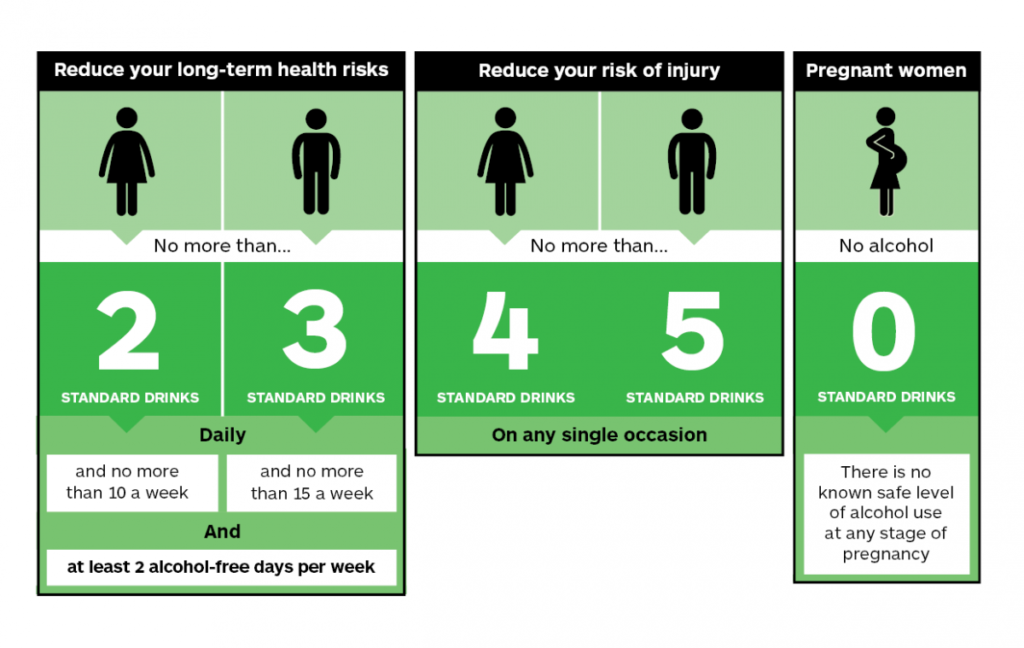Alcohol at a bar is like coffee at a café. Alcohol to complement a meal is like tea or coffee to complement fresh baking. It’s common. However, commonality has eventuated into some scary statistics. Over 80 per cent of adult New Zealanders consume alcohol. This is not the issue. The concern is that statistics has shown alcohol-use disorder is estimated to affect nearly one in five New Zealanders at some point in their lives. Furthermore, rates are highest in our younger generations. In a NZ Health Survey year ended June 2019, 32% of males and 20% of females aged 15-24y were classed as hazardous drinkers, followed by those aged 25-34y at 34% and 16%, respectively.
Alcohol (ethanol or ethyl alcohol) is produced by fermenting sugars from different foods with yeast. This process dates back to pre-historic times producing a variety of alcoholic beverages developed all around the world. This includes wine from grapes, saké from rice, beer from malted barley, and vodka from grains and other foods. In New Zealand, alcohol has been part of the social scene since the arrival of early settlers in the mid-1800s.
Modest consumption of alcohol may provide certain health benefits. However, the relationship is complex. Small doses have been shown to have positive benefits for cardiovascular disease and Type 2 diabetes. Within alcoholic drinks, the antioxidant properties in red wine have received the most attention, with the focus on polyphenols – in particular, the compound resveratrol. When looking at research however, it is important to note how applicable it is to a) humans, and b) to everyday life. There has been limited research on resveratrol in humans, and doses have been in high-dose supplemental forms as opposed to doses we have through everyday foods. Effects from animal testing and test tubes do not always translate to humans. The other factor to consider is c) context. A moderate dose of red wine is included in the Mediterranean diet. However, the Mediterranean diet, considered one of the healthiest diets in the world, is also a lifestyle. The diet is encompassed by their way of life. If you don’t drink, there is certainly no need to start. Antioxidants can be sourced from natural foods without the high calories and in much safer doses. Resveratrol is primarily found in the skins and seeds of grapes and berries.
The calorie content of alcoholic beverages varies depending on the type and especially in mixers such as cocktails and RTDs with added sugar. Alcohol alone per gram has a similar amount of calories as fat. It is also always easier to drink calories than to chew it!
One standard size glass of red wine is 100ml (and one generally pours more for themselves than the bartender!!). So let’s say you had some wine whilst cooking, and a large glass during dinner. If we rounded it to 300ml of wine, you would have eaten almost an additional two jelly-tip ice-creams with your dinner meal!
Alcohol is processed a lot earlier compared to carbohydrates, fat and protein. Being one of the few nutrients that get absorbed from the stomach, about 20 percent is absorbed through an empty stomach wall, affecting signals to the brain. Hence, the standard advice is not to drink on an empty stomach. Women also absorb about one-third more alcohol than men given the same amount, thus alcohol recommendations for women are lower.
There is no level of drinking that is safe for all people all the time. If you drink, do so in moderation and be savvy. Check out the infographic below. Alcohol.org.nz is a great website with a wealth of information and a fantastic range of interactive tools. Here are some I have selected below:
‘Alcohol and Your Body’
https://www.alcohol.org.nz/alcohol-its-effects/body-effects/body-effects-tool/alcohol-and-your-body
‘A Guide to Standard Drinks’
https://www.alcohol.org.nz/help-advice/standard-drinks/a-guide-to-standard-drinks/the-guide
‘Can You Pour a Standard Drink?’
https://www.alcohol.org.nz/help-advice/about-standard-drinks/can-you-pour-a-standard-drink

